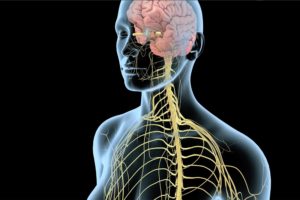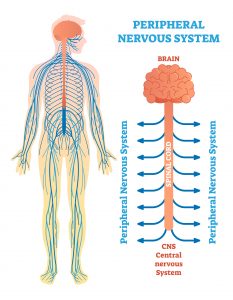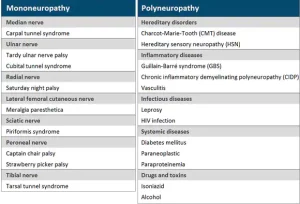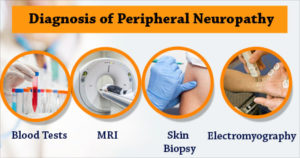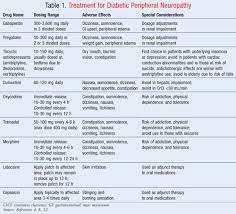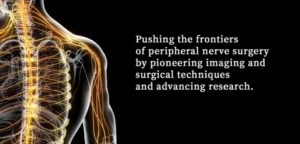Peripheral Neuropathy Diagnosis:
The symptoms and body parts affected by peripheral neuropathy are so varied that it may be hard to make a diagnosis. If your healthcare provider suspects nerve damage, he or she will take an extensive medical history and do a number of neurological tests to determine the location and extent of your nerve damage. These may include:
- Blood tests
- Spinal fluid tests
- Muscle strength tests
- Tests of the ability to detect vibrations
Depending on what basic tests reveal, your healthcare provider may want to do more in-depth scanning and other tests to get a better look at your nerve damage. Tests may include:
- CT scan
- MRI scan
- Electromyography (EMG) and nerve conduction studies
- Nerve and skin biopsy
Peripheral Neuropathy Treatment:
Usually a peripheral neuropathy can’t be cured, but you can do a lot of things to prevent it from getting worse. If an underlying condition like diabetes is at fault, your healthcare provider will treat that first and then treat the pain and other symptoms of neuropathy.
In some cases, over-the-counter pain relievers can help. Other times, prescription medicines are needed. Some of these medicines include mexiletine, a medicine developed to correct irregular heart rhythms; antiseizure drugs, such as gabapentin, phenytoin, and carbamazepine; and some classes of antidepressants, including tricyclics such as amitriptyline.
Lidocaine injections and patches may help with pain in other instances. And in extreme cases, surgery can be used to destroy nerves or repair injuries that are causing neuropathic pain and symptoms.
Peripheral Neuropathy Prevention:
Lifestyle choices can play a role in preventing peripheral neuropathy. You can lessen your risk for many of these conditions by avoiding alcohol, correcting vitamin deficiencies, eating a healthy diet, losing weight, avoiding toxins, and exercising regularly. If you have kidney disease, diabetes, or other chronic health condition, it is important to work with your healthcare provider to control your condition, which may prevent or delay the onset of peripheral neuropathy
Peripheral Neuropathy Management:
Even if you already have some form of peripheral neuropathy, healthy lifestyle steps can help you feel your best and reduce the pain and symptoms related to the disorder. You’ll also want to quit smoking, not let injuries go untreated, and be meticulous about caring for your feet and treating wounds to avoid complications, such as the loss of a limb.
In some cases, non-prescription hand and foot braces can help you make up for muscle weakness. Orthotics can help you walk better. Relaxation techniques, such as yoga, may help ease emotional as well as physical symptoms.
